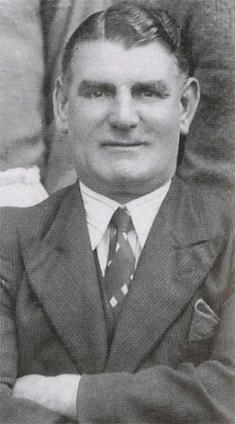
Portsmouth Football Club is a professional association football club based in Portsmouth, Hampshire, England. The team is currently competing in the EFL Championship, the second level of the English football league system in the 2024–25 season after winning the 2023–24 EFL League One title. Portsmouth are nicknamed Pompey, a local nickname used by both His Majesty's Naval Base, Portsmouth and the city of Portsmouth. The club adopted blue shirts in 1912 and have mostly used a combination of white shorts and red socks since 1946.
Robert Frederick John was a Welsh football player and coach.
Warneford Cresswell was an English international footballer who was described as "The Prince of Full Backs" for his renowned tackling and positional skills in the right-back position. In a seventeen-year career in the English Football League he made 571 league appearances, and won seven caps for England.

The 1934 FA Cup final was won by Manchester City in a 2–1 win over Portsmouth. The match is most remembered for a young Frank Swift's heroics in goal and the predictions of City forward Fred Tilson. The match was also refereed by future FIFA president Stanley Rous, in his penultimate game as an official.

Joseph Smith was an English professional football player and manager. He is eleventh on the list of England's top-flight goal scorers, scoring 243 league goals. He was manager of Blackpool for 23 years and guided them to victory in the 1953 FA Cup final, the only time they have won the competition since their 1887 inception.
The South Coast Derby is a term used to describe football matches played between Portsmouth Football Club and Southampton Football Club. The term is popular in broadcast media and newspapers.

The 1939 FA Cup final was contested by Portsmouth and Wolverhampton Wanderers at Wembley. Portsmouth won 4–1, with goals from Bert Barlow, John Anderson and two by Cliff Parker. Dicky Dorsett scored Wolves' effort.
James McAlinden was an Irish footballer who played as a forward for several clubs, most notably, Belfast Celtic, Portsmouth, Shamrock Rovers and Southend United. As an international, McAlinden also played for both Ireland teams – the IFA XI and the FAI XI. After retiring as a player, he went on to manage Glenavon, Distillery and Drogheda United.
Frederick J. Worrall was an English footballer born in Warrington, Lancashire, who played as an outside right in the Football League for Oldham Athletic, Portsmouth and Crewe Alexandra. He was capped twice for England, scoring on his debut against the Netherlands in Amsterdam in May 1935, before following it up with another goal in England's 3–1 win over Ireland in the British Championship in November 1936. He was noted for his superstitious nature: when Portsmouth played in the 1939 FA Cup Final, he took his small horseshoe, put a sprig of white heather in each sock, tied a small white elephant to one of his garters and put a lucky sixpence in his boots, as well as putting on Pompey manager Jack Tinn's lucky spats. He set up the second goal in Portsmouth's 4–1 win, and left the club at the end of the Second World War. He had continued to play for Portsmouth during the war, but also made seven appearances for Manchester United during the 1945–46 War League season, scoring twice.
Portsmouth Football Club is a professional association football club based in Portsmouth, England, founded in 1898. Football was first played in Portsmouth from at least the middle of the 19th century, brought to the Victorian era military town, by soldiers, sailors and dockers from other places in England. In Northern England the rules of football were already well established. Portsmouth Association Football Club was an amateur team founded in 1883 by architect Arthur Edward Cogswell. Its most famous player was Sir Arthur Conan Doyle, who played as goalkeeper under the pseudonym "A.C. Smith." The club disbanded in 1896, and Cogswell designed the first buildings at Fratton Park. Portsmouth Town was an amateur team before Portsmouth became a city in 1926. They competed in cup competitions, attracted several thousand spectators by 1891, and attempted to become Portsmouth's first professional club, but failed. Royal Artillery (Portsmouth) Football Club was formed by the Portsmouth regiment of the Royal Artillery. Established in 1894, they were notable for their competitive success and support from the local community. The team played home games at the United Services Recreation Ground and achieved significant victories.
William Rochford was an English footballer. A member of the Portsmouth team that won the 1939 FA Cup, he played over 100 matches for Portsmouth and for their south coast rivals, Southampton.

Alfred Henry Strange was an English footballer who played most of his career as a half back with Sheffield Wednesday. He won 20 caps for England, including three as captain.
Jack Froggatt was an English footballer.
Reginald Flewin was an English footballer who played as a central defender for his hometown club Portsmouth.
Wyndham William Pretoria Haines was an English footballer who played at centre-forward for south coast rivals, Portsmouth and then Southampton in the 1920s and 1930s.
John Arkison McIlwaine was a Scottish footballer who played as a centre half for Portsmouth, where he captained the team in the 1929 FA Cup Final, before moving to south coast rivals Southampton. He also played for Falkirk and Llanelly, whom he helped win the Welsh Football League championship in 1932–33.
James Ferrier Easson was a Scottish footballer who played as an inside-forward for Portsmouth in the English Football League, helping them reach the FA Cup Final in 1934. He also made three appearances for the Scotland national team.
Thomas William Bushby was an English footballer who played as a half back. Born in Shildon, Bushby began his career with Southend United in 1934, and later played for a number of Hampshire-based teams including Portsmouth and Southampton, before retiring from professional football in 1947.
Joseph Kirby Smith was an English footballer who played as a left-back in the Football League for Watford.



